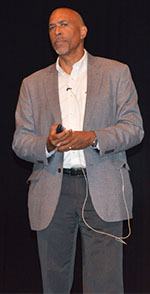A child’s background remains the biggest predictor of his or her success in the classroom, said professor and author Pedro Noguera. But that doesn’t have to be the case.
“Your background should not determine what you can accomplish in education,” he said.
There are examples across the country of schools that prove it’s possible to cultivate talent in all students and achieve at high levels despite socioeconomics, he said.
High achievement is occurring in high-poverty schools with high-minority populations when key components are in place that help students overcome barriers. It’s still rare, but can be emulated.
School News Network has documented the high correlation between poverty and student achievement and schools that buck that trend.
Noguera, professor of education at New York University, presented “Excellence Through Equity: Five Principles of Courageous Leadership to Guide Achievement for Every Student” to Kent County educators on Aug. 20 during the 12th Annual Diversity Kick-Off event at Northview High School.
For a school to provide true equity — where all students are on a level playing field and given opportunities to fulfill their potential — teachers, parents, and community members must embrace students as “our kids,” no matter what challenges they have, he said.

“You can’t ignore hungry children,” he said. “You can’t pretend students without a stable place to live won’t have a hard time getting their homework done. You can’t pretend that the social, the economic, the psychological needs of a child can be separated from their academic needs.”
“If we ignore the differences kids bring (to school), we will continue to produce unequal outcomes … Equity is about understanding who kids are and responding to their needs,” he said.
Federal education policies, like No Child Left Behind, are based on a limited view of what equity requires, Noguera said. Meeting the needs of students requires recognizing their differences.
“It’s common sense,” he said. “Common sense is not that common, and when it comes to education policy it’s increasingly rare.”
High expectations need to be in place for all students.
“Equity is not about accepting the minimum for kids, it’s about demanding excellence,” Noguera said.
The Responsibility is Everyone’s
Ten Principles to Guide Achievement for Every Student
|
Evidence points to various reasons some low-income schools outperform their peers, Noguera said. In those schools, teachers know how to connect and engage the students; parental involvement is a high priority; businesses and organizations partner with the school district; student discipline focuses on helping students improve rather than penalization or suspension; and teachers know where every child is at with their learning. Teachers collaborate and learn from one another.
It can seem like a daunting set of goals, but teachers should focus on the control they do have, he said. Too often, teachers get lost in the requirements doled out from legislators who don’t have a clear sense of what goes on in the classroom. They get stuck on constraints and lose sight of what can be done.
“Whenever you hear someone blaming someone else, they are probably not taking responsibility for things they can control,” he told the near-capacity crowd.
Make it About Connecting Students with School
Noguera challenged West Michigan educators to a radical idea, but one necessary to get past a focus on test scores and on to true student learning: “Don’t think about achievement at all. Focus on getting kids excited about learning.”
Doing so requires courage.
“We are at a time when we confuse actually helping schools with pressure. We think that threats and pressure will lead to improvement,” he said, noting threats from legislators and actions to fire staff and shut down schools. “There’s no evidence that works.”
The effect ripples throughout the community.

“It’s having the opposite effect. It’s driving good educators out of the profession entirely. It’s resulting in them leaving communities that really need them as an asset and a source of stability for families that need them and I think in many ways, it’s threatening our whole democracy.”
Affluent towns abut low-income towns that are devastated by poverty; the achievement gap should be recognized for what it really is, Noguera said: an opportunity gap. If it continues to grow, the American Dream is threatened.
“If we just do what we’ve been doing, it will only get worse.”
Godwin Heights Public Schools Superintendent William Fetterhoff said he found Noguera’s words reaffirming. The high-poverty district houses both North Godwin Elementary, which achieves well above its peers, and Godwin Heights High School, which has been named a state of Michigan priority school because of low achievement.
“These are things we have gone through,” Fetterhoff said. “It’s a lot of hard work, and when I hear and see someone with a global perspective, it’s very reaffirming that we are doing the right things and we need to broaden our scope and look even more at bringing in new and innovative ideas.”
CONNECT
Schooling for Resilience: Improving the Life Trajectory of Black and Latino Boy









